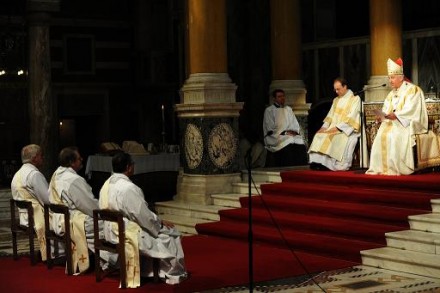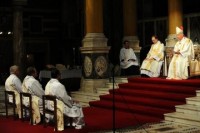Vincent Nichols’ Sermon

 Yesterday the Ordinariate officially got underway with the three defecting bishops being ordained priests in the Roman Catholic church. Vincent Nichols’ sermon was actually quite interesting. Forget the fuss over the Ordinariate being dedicated to Mary (of Walsingham no less – nice little dig at the “two shrines” business there I thought, and a reminder that Anglicanism formally rejects such “fond thing[s] vainly invented” ), for me the interesting paragraph to ponder was this one.
Yesterday the Ordinariate officially got underway with the three defecting bishops being ordained priests in the Roman Catholic church. Vincent Nichols’ sermon was actually quite interesting. Forget the fuss over the Ordinariate being dedicated to Mary (of Walsingham no less – nice little dig at the “two shrines” business there I thought, and a reminder that Anglicanism formally rejects such “fond thing[s] vainly invented” ), for me the interesting paragraph to ponder was this one.
In his Letter to the Ephesians, St Paul speaks about the variety of gifts given to the community of believers. While recognising that variety, in this Mass we focus, in particular, on the gift of the ordained priesthood within the Catholic Church. It is a priesthood which takes it shape, its purpose, its experience from the Cross of Christ, the great cross above us, referred to so movingly by Pope Benedict. Through this ordained priesthood, the one, same sacrifice of Christ is made real at the altar and offered again to the Eternal Father. It is made present as the sacrament of our salvation. This Mass, every Mass, is at once the prayer of Christ and the prayer of the Body of Christ, his people. Through it Christ constitutes the Church afresh each day, both in Himself and in its visible unity, in the world. This is the work of the ordained priest – the daily constituting of the Church – and it is a priceless gift and service for which we thank God constantly. To this one sacrifice we bring our own small sacrifices, the losses and hardships we carry through failure and sin, through the pursuit of truth and love, through the passing of time. All is offered to the Father in one sacrifice of praise to become a means of our salvation.
What I’ve done is highlight in red the bits I don’t agree with, and it surprised me how with just the removal of a few words I could probably agree with most of what the Archbishop said.
Would you have had more or less words in red?
I suppose the main bits I'd keep in are the two occurrences of "[means] of our salvation", though I might understand them slightly differently from the good archbishop. The sacrament of the altar is one of the chief means (along with preaching, baptism and absolution) by which Christ brings his salvation to us: i.e. it's a means of grace, which (IIRC) is good Anglican theology…
Truthfully it still seems strange to me that clergy in England are expected to uphold the 39 Articles (wouldn't you yourself agree that *some* of them are more interesting as historical curios or not-ideal expressions of non-central matters? Don't think I've *ever* heard an Anglican Evangelical rail against believer's baptism!). I can understand that you think liberals (and surely Anglo-Catholics?) are heretical in taking vows that they don't *strictly* uphold, but the fact that the 39 Articles are a feature of them seems to me to make it *more* likely that priests (and possibly ordaining bishops) will regard much of the ceremony as pomp and circumstance not necessarily to be taken literally. Should a C of E priest who celebrates with the Roman Missal, and offers prayers to Mary (for example) be subject to action under canon law? If not, why not?
Good piece by your brother too. Yesterday there was a guy on the news saying that the C of E was taking its cue from the culture rather than Christ, hence the impetus to swim the Tiber. There's not much integrity in conservatives deciding that mariology, the real presence, purgatory,etc might be theologically problematic but ,as women bishops are worse, conversion to Rome is the only option. So one hopes that the bishops converted yesterday for the right reasons (although, in fairness, I can see an argument that if you accept the Petrine Succession and Magisterium, then doctrines like mariology might be justifiable, however unpalatable they seem).
Have to say that I can see the appeal of the skimpy T shirts and the cowboy hat (were they singing about something theological then?) More interesting than Vincent Nichol's sermon anyway.
I think if you went a bit deeper into the Archbishop's homily you would not have any real problems. perhaps Augustine would help.
Also, "Mariology" is actually orthodox. The Council of Ephesus? if she has the title "Mother of God" – Theotokos, much follows from that, but we do not need to go any further than Our Lord's humanity in the sense that as you and I have deep respect for our mothers so we can surely see that His repect and love for His mother is way beyond ours, being perfect. Since the Ark of the Covenant needed to be inlaid with gold (signifiying purity) in order to hold the tablets, a remnant of the manna, and
Aaron's rod (a symbol of his priesthood) shouldn't Mary have had to be pure (Panagia?) in order to contain the Lord in her womb? Is she not more important than a wooden box covered in gold?
One of my personal puzzles is the relationship between the Eucharist and justification. I believe in justification by faith, as a good son of the Reformation, but as a Catholic minded Christian have always seen the necessity of the sanctification that the sacrament provides. But sometimes I wonder, particularly when reading passages like John 6, if there isn't some deeper relationship between the sacrament and the way in which God not only purifies us but saves us.
That being said, I can see why the words you highlighted caught your attention, though I probably wouldn't have noticed them if I were just listening to the sermon. The idea that each Eucharist is a new sacrifice, rather than a recapitulation of the one and only sacrifice, is a problem for any Anglican who takes the prayer book seriously. But I wonder if this is more a problem of semantics in word choice than an actual, outright theological contradiction. I suspect we're a lot closer to each other than we think we are, Anglican Evangelicals included.
Is our inability to fully articulate what's going on something to do with the fact that the Eucharist is a re-presentation of the means of our salvation. It's ultimately musterion (which is not to say that we can't understand those aspects that God has revealed to us) and in trying to explain how that mystery works we are simply going to run out of steam.